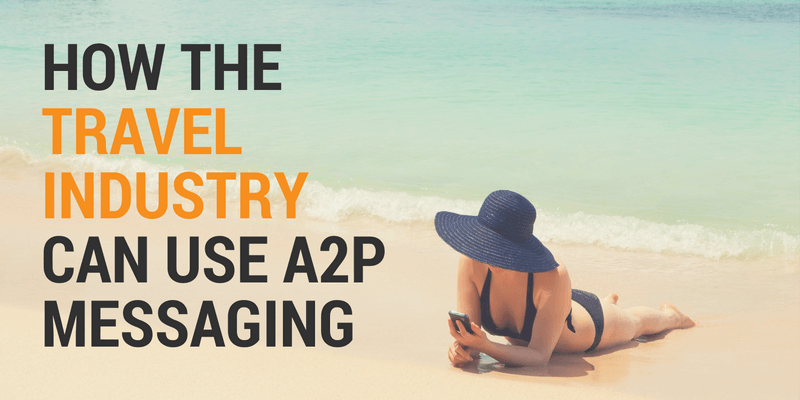Can Travel Agents Use SMS Messaging to Stay in Business?

“European travel agents don’t like it”.
That’s a statement made by one of the gentleman at my table during the mCommerce Summit earlier this month. He is from Cruise America, a successful RV (camper) vacation rental company based in Arizona, but with 123 locations around the US.
We were talking about his company and their online and mobile reservation options. He said about 40% of their rentals come from overseas, most of them from Europe. And they get in trouble with their European travel agents when they allow people to book directly online or via mobile.
The issue is that Americans have a strong preference for booking online (driven by the desire for the lowest price), so if they don’t offer that ability, their business suffers. But at the same time, the European travel agents lose business when customers are allowed to book directly with the company online. And that’s why they don’t like “it”.
Since his company appreciate and want to work with their European partners, they can’t, or haven’t, implemented the ability to book that way. Even in the US, longer term rentals require a phone call, visit, or booking through a travel agency.
Depending on the source you read, the US travel agent business is either declining or rising a little, but not as fast as online booking options. But according to the article “European travel agents survive online onslaught”, the situation is different in Europe. “[C]onsumers prefer expert advice and a friendly face when it comes to booking their holidays,” the article contends. In France, Britain, and Germany travel agents are doing “record levels” and growing.
Culturally, Europeans seem to prefer the personal touch. But how long will that last, and can travel agencies use SMS messaging to stave off the “onslaught”?
The future of online booking
It isn’t too hard to understand why many people still prefer travel agents over online booking. There are so many online sites to check that it can take hours or days to really understand what’s available and then book directly. Travel agents save a lot of time by doing all the hard work of research and itinerary organising for the consumer.
But there’s another wave of online booking sites, and mobile apps, that promise to deliver a complete package for a consumer in much the same way a travel agent does.
One very new example is Hellogbye. It’s a mobile app that is still in beta testing, but you can watch the concept in the video below.
You talk to the app and let it know what you want to do. It understands you and creates a travel plan for you. The company claims that it will work with natural speech – not just slow, limited vocabulary commands like many voice enabled technologies. Their simulation in the video makes it look easy. Will the app deliver that capability? We’ll have to wait and see, but if it works there are some who may find that easier than contacting an agent.
Two other online services that create full itineraries based on search conditions are Inspirock and Tripcreator. I tested them out and they did create a plan for me based on my inputs. And I got it all faster than calling an agent. But after I saw what those services selected for me, I think an agent explaining an itinerary may have been easier to understand.
But the point is that this sort of technology is here, and more is coming. Undoubtedly the algorithms will get better over time and might reach the point where some people are satisfied with them enough to stop using travel agents.
When might that happen? At the rate technology advances it might only be a few years – or 20 – but it will happen.
Can SMS messaging help?
Some of these automated services (or even current online booking sites) may use SMS messaging to alert their customers of cancelled flights or other major changes to their itinerary.
As a travel agent, you can do better. You know your customers, you know what they like, where they are going, when they will be in certain locations. And you’re a real person who can put all that together and know when your customers may need a little extra info.
Maybe they’re scheduled for an early bus tour, followed by a hike in a nature preserve in the afternoon. You know it’s predicted to rain while they are out, even though the morning is sunny. How grateful would they be for a short message in the morning before they leave letting them know they should bring their umbrellas? I imagine they’d be very grateful. Actually I know they would be because this happened to my daughter while touring Paris last year. She ended up getting soaked in the afternoon while riding a boat on the Seine (not a nature hike but otherwise the same). There was nothing she could do but get wet. She would have appreciated a notice warning her of the weather change!
Of course there are many other uses of SMS messaging beyond itinerary changes and weather notifications. Perhaps you discover a recreation boating facility is offering 50% off rentals for just that one day. You can send a message to all your customers on holiday in that area.
If a customer is unhappy with the hotel or the room they’re given for some reason, you can send them a message to let them know you’ll take care of it, and give them a suggestion of what to do while you work it out. Maybe you can send them directions via SMS messaging to the best local bakery with the most amazing pastry. Once you’ve found a solution (new room, new hotel – whatever), you can send them another message with instructions or arrange a call if need be.
It’s little things like this that online automated programs probably won’t ever be able to do. Personal attention offered in a direct, but non-intrusive way could keep customers coming back to you year after year. Well, that’s why they already do you may be thinking. But as everyone becomes more mobile, SMS messaging opens new ways for you to provide that personal service.
The onslaught of online booking isn’t over. It may just be getting warmed up. But travel agents can start using technologies like SMS messaging to add value to their services, and keep customers happily going on holiday.
Related Articles
5 Ways Guest Houses Can Benefit from SMS Marketing
5 Ways the Travel Industry can Make Use of SMS Marketing
In order to appeal to new customers and interact with existing ones, businesses are always looking for new marketing methods. Whilst many companies are using traditional and online marketing techniques, these aren’t always effective. Email filtering, for example, means that many recipients may not even be aware that they’ve received contact from your company. As many email hosts provide in-built spam filters, it’s easy for email marketing content to be overlooked or ignored completely. SMS marketing, however, overcomes many of the obstacles associated with online and email marketing. Whilst potential customers may not see your company emails, SMS messages aren’t filtered in the same way. The delivery rate is, therefore, far higher for SMS messages in comparison to marketing emails.
Travel Agencies Love SMS Messaging
For travel agencies, SMS messaging allows you to connect with travellers on a one-to-one, or one-to-many basis, yet still be personal. How can that be? People guard their mobile numbers and only share them with the people or businesses they really want to hear from. It's their personal number after all, and they won't hand it out to just anyone.
How the Travel Industry can use A2P Messaging
The travel industry has made some inroads into using SMS messaging, but hasn’t yet taken real advantage of the potential of A2P messaging. Find out how it can be used to save time and provide the high-quality service today’s mobile travellers expect.
3 Ways Travel Agencies Can Take Full Advantage of SMS Messaging
The recent weather likely has many people thinking about their summer holiday. It's great news for travel agents looking to book ahead for the coming months. If you're a travel agent, SMS messaging is fast becoming a primary way to communicate with your clients.
3 Examples of Using SMS Messaging for Hotel Customer Satisfaction Surveys
Even great hotels sometimes have a mix up or some sort of problem that can affect a guest. And with social media and hotel review sites, chances are a disgruntled guest isn’t going to keep their complaints to themselves. Here are three examples of how to use SMS messaging to gauge customer satisfaction.
Hоw Cоасh Tоur Companies Can Use SMS Mаrkеtіng
Personalising Your SMS Marketing
Using people’s names in marketing is great. It does provide a certain level of personalisation that can get people more interested in what you’re sending them. Of course in text messaging, you don’t always have the room for a name, your message, and the required opt out information … usually there just isn’t enough room. So how can you make your marketing messages personal?
SMS Marketing: Four Sectors Successfully Using Text Messaging
SMS marketing has seen a huge uplift in popularity in recent years, with big brands investing in the technology to better engage with their customers. There are so many benefits of SMS marketing, from the ability to directly to reach customers with your communications, to the fact that over 80% of SMS texts are read. With over approximately 90% of the world receiving mobile coverage, you’re highly likely to be able to reach your audience, regardless of where they are. SMS marketing is cost effective, and campaigns are quick to develop, in as short a time period as the time it takes to write a text message. This gives you the advantage of being able to communicate quickly, and effectively with customers, reacting to information almost instantaneously. With so many reasons to use SMS marketing, we’ve highlighted four sectors successfully using SMS messaging as case studies to highlight the advantages of investing in the technology.












